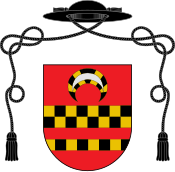
Back Sant Francisco Xabier AN فرنسيس كسفاريوس Arabic فرنسيس كسفاريوس ARZ Franciscu Xavier AST Fransisk Ksaveri Azerbaijani Францыск Ксаверый Byelorussian Францішак Ксавэры BE-X-OLD Франциск Ксаверий Bulgarian Frañsez Zavier Breton Francesc Xavier Catalan
Francis Xavier | |
|---|---|
 Painting of Saint Francis Xavier, held in the Kobe City Museum, Japan | |
| Born | Francisco de Jasso y Azpilicueta 7 April 1506 Javier, Kingdom of Navarre |
| Died | 3 December 1552 (aged 46) Shangchuan Island, Chuanshan Archipelago, Xinning, China |
| Venerated in | |
| Beatified | 25 October 1619, Rome, Papal States, by Pope Paul V |
| Canonized | 12 March 1622, Rome, Papal States, by Pope Gregory XV |
| Feast | 3 December |
| Attributes | |
| Patronage |
|
| Styles of Francis Xavier | |
|---|---|
 | |
| Reference style | The Reverend Father |
| Spoken style | Father |
| Posthumous style | Saint |
| Part of a series on the |
| Society of Jesus |
|---|
 |
| History |
| Hierarchy |
| Spirituality |
| Works |
| Notable Jesuits |
|
|
Francis Xavier, SJ (born Francisco de Jasso y Azpilicueta; Latin: Franciscus Xaverius; Basque: Frantzisko Xabierkoa; French: François Xavier; Spanish: Francisco Javier; Portuguese: Francisco Xavier; 7 April 1506 – 3 December 1552), venerated as Saint Francis Xavier, was a Basque Spaniard[3][4] Catholic missionary and saint who co-founded the Society of Jesus and, as a representative of the Portuguese Empire, led the first Christian mission to Japan.[5][6]
Born in the town of Xavier, Kingdom of Navarre, he was a companion of Ignatius of Loyola and one of the first seven Jesuits who took vows of poverty and chastity at Montmartre, Paris in 1534.[7] He led an extensive mission into Asia, mainly the Portuguese Empire in the East, and was influential in evangelization work, most notably in early modern India. He was extensively involved in the missionary activity in Portuguese India. In 1546, Francis Xavier proposed the establishment of the Goan Inquisition in a letter addressed to King John III of Portugal.[8][9][10][11] While some sources claim that he actually asked for a special minister whose sole office would be to further Christianity in Goa,[12] others disagree with this assertion.[13] As a representative of the king of Portugal, he was also the first major Christian missionary to venture into Borneo, the Maluku Islands, Japan, and other areas. In those areas, struggling to learn the local languages and in the face of opposition, he had less success than he had enjoyed in India. Xavier was about to extend his mission to Ming China, when he died on Shangchuan Island.
He was beatified by Pope Paul V on 25 October 1619 and canonized by Pope Gregory XV on 12 March 1622. In 1624, he was made co-patron of Navarre. Known as the "Apostle of the Indies", "Apostle of the Far East", "Apostle of China" and "Apostle of Japan", he is considered to be one of the greatest missionaries since Paul the Apostle.[14] In 1927, Pope Pius XI published the decree "Apostolicorum in Missionibus" naming Francis Xavier, along with Thérèse of Lisieux, co-patron of all foreign missions.[15] He is now co-patron saint of Navarre, with Fermin. The Day of Navarre in Navarre, Spain, marks the anniversary of Francis Xavier's death, on 3 December.
- ^ "Holy Men and Holy Women" (PDF). Churchofengland.org. Archived (PDF) from the original on 7 September 2012.
- ^ "Notable Lutheran Saints". Resurrectionpeople.org. Archived from the original on 16 May 2019. Retrieved 16 July 2019.
- ^ "St. Francis Xavier was a Spanish Jesuit who lived as a Roman Catholic missionary in the 1500s" https://www.britannica.com/question/Who-is-St-Francis-Xavier
- ^ "Jesuit missionary. Born at the castle of Xavier (Javier) in Navarre, Francis, a Basque Spaniard, was educated at the University of Paris." https://www.oxfordreference.com/display/10.1093/oi/authority.20110803125202415
- ^ Schurhammer, Georg (1982). Francis Xavier: His Life, his times – vol. 4: Japan and China, 1549–1552.
- ^ Roldán-Figueroa, Rady (2021), "Background: Catholic Missions in Japan", The Martyrs of Japan, Brill, pp. 13–34, ISBN 978-90-04-45806-2, retrieved 30 March 2024
- ^ Attwater 1965, p. 141.
- ^ Neill 2004, p. 160: "By another route I have written to your highness of the great need there is in India for preachers... The second necessity which obtains in India, if those who live there are to be good Christians, is that your highness should institute the holy Inquisition; for there are many who live according to the law of Moses or the law of Muhammad without any fear of God or shame before men".
- ^ Rao 1963, p. 43.
- ^ "How did St. Francis Xavier shape Catholicism? | Britannica". www.britannica.com. Retrieved 12 July 2022.
However, his actions in India were not without controversy, as he was involved with the establishment of the Goa Inquisition, which punished converts accused of continuing to practice Hinduism or other religions.
- ^ "Goa Inquisition". The New Indian Express. Archived from the original on 18 November 2015. Retrieved 26 June 2017.
- ^ Coleridge 1872, p. 268.
- ^ Neill 2004, pp. 160–161: [Let the king warn the governor that] "should he fail to take active steps for the great increase of our faith, you are determined to punish him, and inform him with a solemn oath that, on his return to Portugal, all his property will be forfeited for the benefit of the Santa Misericordia, and beyond this tell him that you will keep him in irons for a number of years... There is no better way of ensuring that all in India become Christians than that your highness should inflict severe punishment on a governor".
- ^ De Rosa 2006, p. 90.
- ^ Pope Pius XI (14 December 1927). "Apostolicorum in Missionibus". Papal Encyclicals Online. Retrieved 1 November 2014.
© MMXXIII Rich X Search. We shall prevail. All rights reserved. Rich X Search